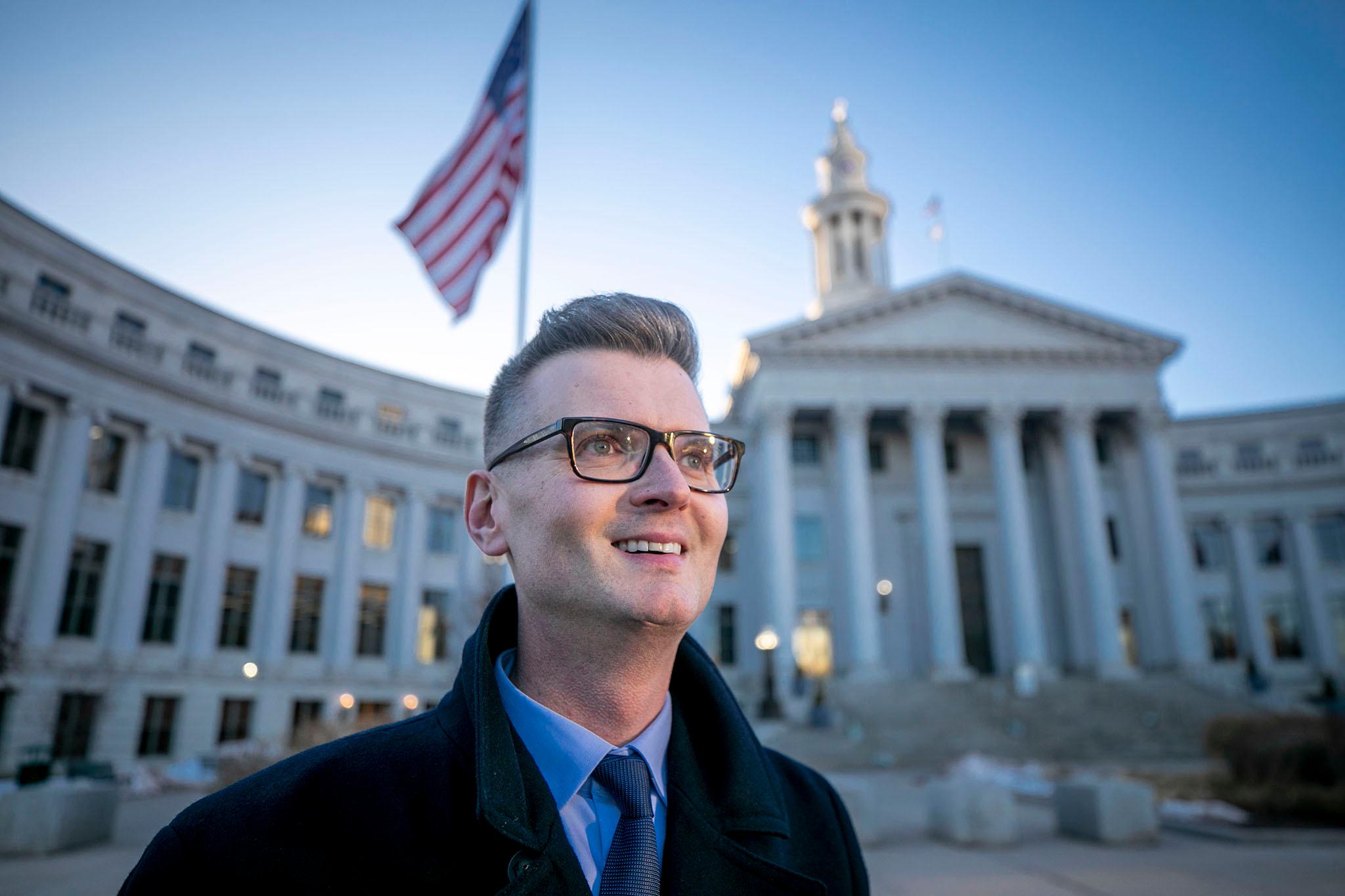Travis Leiker was born in Kansas, and moved around a lot growing up. He went to high school in Broomfield, and says he can point to the exact moment he knew he wanted to settle down in Denver. It was eating his first meal in the city, at the Cheesecake Factory on the 16th Street Mall.
"I just fell in love with the city immediately because it had this sense of optimism," he said. "That moment also resonates with me, that first time that I was in the city, in that I saw pride flags, I saw diversity, and at the time I was a closeted gay kid struggling with my own identity, but I also knew that this was a place that was inclusive and welcoming."
Now, over 25 years later, Leiker is running for City Council at-large. With Councilmembers Robin Kniech and Debbie Ortega term limited, and Ortega running for mayor, it's a crowded, open race. He's running against Will Chan, Dominic Diaz, Serena Gonzales-Gutierrez, Tim Hoffman, Travis Leiker, Sarah Parady, Penfield Tate III, Marty Zimmerman and write-in candidate Janelle Jenkins.
Leiker's background is in politics and fundraising, and he touts experience with public-private partnerships and revitalizing organizations.
After college, Leiker worked for Gov. Jared Polis back when Polis chaired the State Board of Education. Then he held a range of different roles in the political world, including for the White House Project, a now-defunct organization that worked to grow female representation in government and leadership, and Conservation Colorado, a non-profit advocating for environmental issues.
Most recently, he's worked in development and philanthropy for the University of Colorado. Leiker also spent time as president of Capitol Hill United Neighborhoods, helping the group come back from financial struggles and grow its public-private partnerships.
He lists eight top issues: Housing, homelessness, community investment, crime and safety, government efficiency, electoral process, economic development and "getting big things done."
On housing and homelessness, Leiker supports expediting housing projects, preserving current affordable housing, investing in land trusts, waiving taxes on building materials for affordable housing, converting and improving older properties and growing assistance for renters and first-time homeowners. He also thinks Denver needs to improve data gathering on homelessness and grow things like wrap-around services, and tiny home villages.
On public safety, Leiker supports growing staff, including police, to pre-pandemic levels, while focusing on diversity and training. He wants to grow the Support Team Assisted Response (STAR) program, which sends mental health clinicians and paramedics in place of police to nonviolent calls. At an at-large debate earlier this month, Leiker stood in support of the urban camping ban.
Community investment would look like measures including more parks and open space, investment in marginalized neighborhoods, expanding car sharing and public transit, growing composting and recycling and improving infrastructure. On the economic development side of things, Leiker wants to grow underrepresented developers, look into sustaining programs funded through temporary American Rescue Plan Act money and growing support for small businesses.
Leiker's also raising alarm on less-discussed issues, such as shorter term limits, social media use and other government reform.
Leiker's platform involves lowering city term limits from three four-year terms to two four-year terms. This would include Mayor, Auditor, Clerk and Recorder and City Council spots. Also on government reform, he also wants to ban tweeting and social media by council members during public meetings, grow election oversight and community outreach, expand 311 and raise wages for city jobs and contractors.
Leiker knows these ideas stray from the top issues, but thinks they're important to talk about regardless.
"I'm also leaning into other ideas that may not necessarily be on the front burner, but should be a part of the conversation in terms of the next council's purview," he said. "One of the beauties of being able to run citywide is you see the inequities in urban planning, all across the city, and so my passion and my interest area is making sure that all neighborhoods are equally represented and funded."













